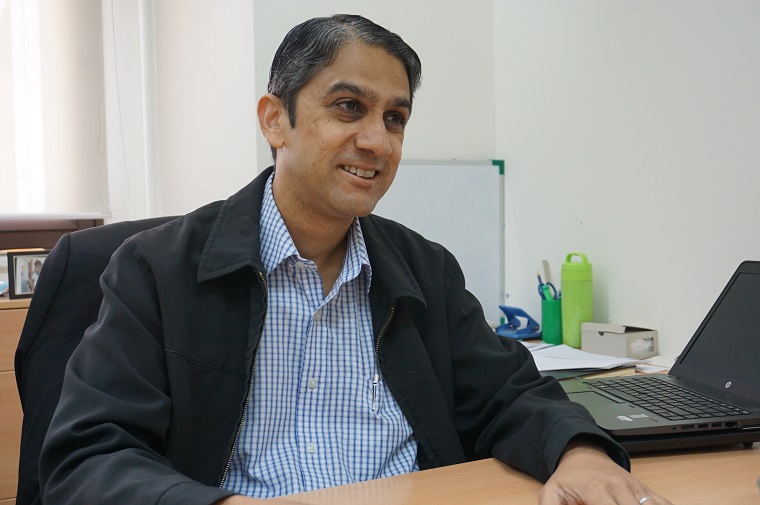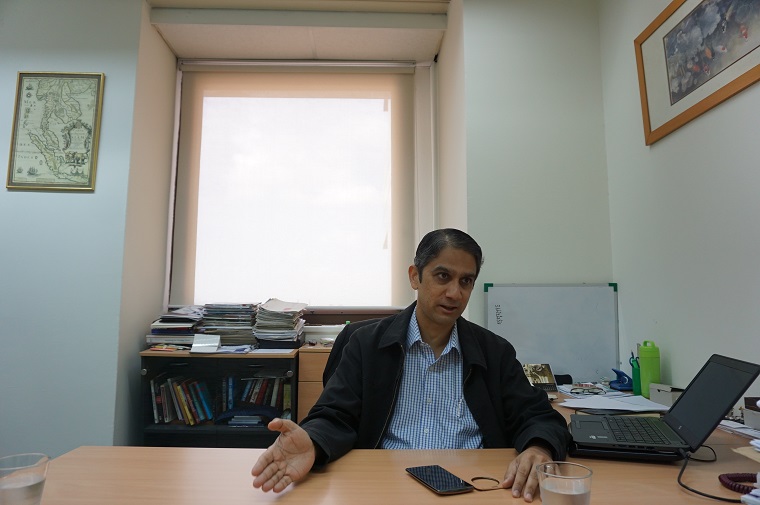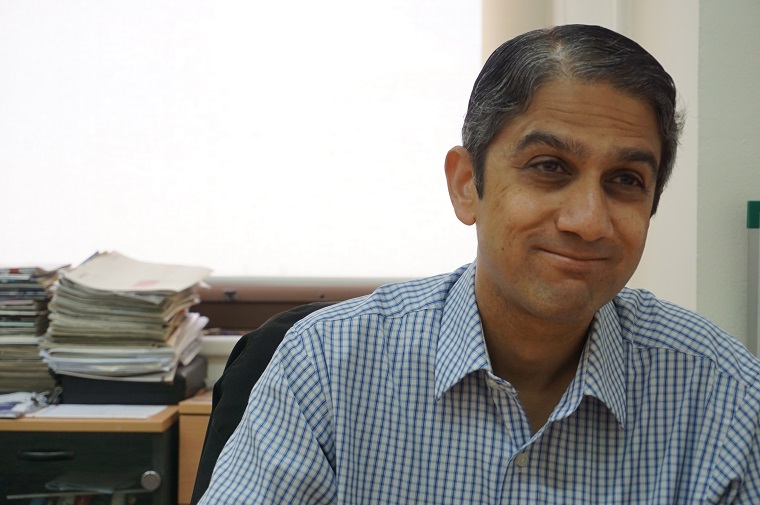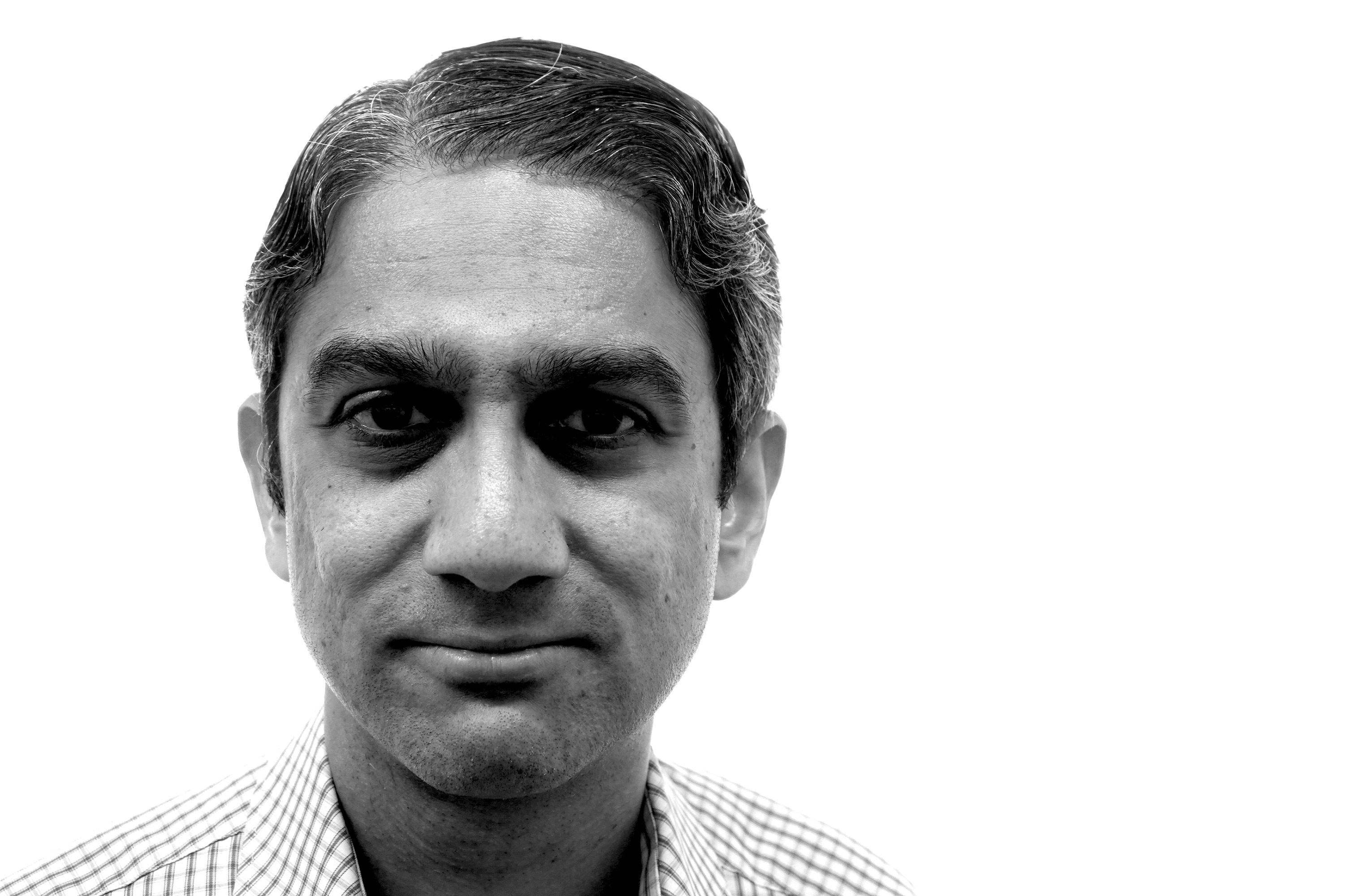The first thing one notices upon walking into Leon Perera's office is his handwriting.
It's so tiny, the word "tiny" doesn't cut it — a few short, neat micro-sized lines were written on a small whiteboard attached to a wall beside his desk, and even though a whiteboard marker was used to write them, they were barely legible. A glance down to an opened paper organiser (yep, he uses one) on his table reveals even smaller scribbles that one would probably become shorter-sighted trying to read.
"I think my handwriting is much worse now (than when in school)," he jokes to Mothership.sg, after relating a traumatic experience in his PSLE English composition exam where they ran out of paper and he had to cram his essay into one sheet. "I don't like writing with a pen, I prefer to type, so I think my handwriting has really gone down. But it also helps me make my notes very encrypted — people can't tell what I'm writing!"
Prior to that, we were welcomed into the nondescript offices housing the research consultancy he co-founded 16 years ago, just off Anson Road.
It's a quiet Friday morning, and the non-constituency Member of Parliament (NCMP) for East Coast GRC is dressed down — checkered short-sleeved shirt under a navy windbreaker over dark pants. After a warm "hello" and a firm handshake, he disappears to bring us glasses of water.
Dull, nerdy, introverted
His room is nothing remarkable: dark file cabinets line one wall, standard stationery clutter all around his desk. One or two small framed photographs of his young son and daughter, aged 7 and 10. On two of his walls, two small framed paintings, fairly simple-looking, almost dull, even, but intricate in their little details — but perhaps, in a big way, they mirror his personality.
The 44-year-old admits rather unabashedly that he is quite like that — in his words, "naturally kind of bookish, and, you know, dull, introverted and a bit academic".
"If you try to project an image that is not true to who you are, people will see through that lah. People are actually very perceptive, that is human nature — especially in the political arena when you are tested in so many ways in debate and in interviews like this, the difference between what you're trying to project and what's the reality will come through and you'll be exposed as a sham. So I don't believe in trying to project something that's not what I am."
We can't deny that, especially after we noticed he didn't feel the need to dress up before being photographed for this interview (heh heh).

Diversity vs. balance
So why force himself into politics? It can't, after all, possibly be something that falls into his comfort zone.
The answer underpins his central focus as an NCMP as well: political balance.
It's not enough to have academics, public intellectuals, civil society, or even Nominated Members of Parliament, says Perera, as we find him wont to do. In fact, he adds, there is a "very important difference" between political diversity and political balance.
"(If) the opposition exists as an unviable party, or an unviable group of parties who can only be NCMPs at best, then that balancing role won't be played by anyone. And what will then gradually happen over time in Singapore is that the government will... eventually feel that it is effectively insulated from any real accountability to the electorate because when they go in to an election, there's no one who can possibly win.
So, therefore, they can pursue a direction they may want to pursue and in the longer term — I'm not saying that's the case with this government — it is human nature that when you have an entrenched government like this that does not have to face really strongly-contested elections, they will be on a gradual slide towards unaccountability, they will be on a gradual slide towards being self-serving, and that's not good for Singapore.
We need to make sure that any government, whatever party is in power, is accountable and it's doing policies that reflect the political character, the political centre of gravity in the country."
It isn't the Workers' Party (WP)... or any other for that matter

Plus, as he's also said before on a couple of occasions, he believes the surge in policy changes and announcements post-2011 isn't really because of or about the WP or anything they said.
"I don't think the credit for that goes to the WP or any other opposition party. I think the credit for that goes to Singaporeans having the confidence to vote in a particular way, and I think (it was) because those signals were sent at the ballot box, because voting took place in that way, that you got those results.
So we're not saying that those ideas and those changes are all to our credit — in fact in my election rally speeches I made this point very very strongly. I do not claim credit for the WP, but likewise, I do not think that the PAP should take credit for it as well. There were even some individual PAP MPs who were pointing some of these things out, backbench PAP MPs before 2011. Did our voices bring about the change? No! Not at all.
...
The PM said there was going to be a strategic shift in policy at his National Day Rally speech in 2013, so I think that period from 2013 to 2015, just two and a half years before the GE, that saw a lot of changes come about. So I think it goes back to how people voted."
Smart and savvy
Certainly, Perera, who is now widely known to have a double-first in philosophy, economics and politics from Oxford be a really bright and brainy guy, is forthcoming with his oft-used topics of focus as an NCMP. He also speaks eloquently of his opinions on Singapore's economy and what he feels needs to be done — to focus greater on developing SMEs into becoming the third engine of our economy, refining productivity benchmarks and encouraging greater innovation from the levels of education, to name a few points.

But a very cautious man
At the same time, he is equally cautious of giving bold answers to questions we posed to him that would require a potentially contentious stance or answer.
These include things like on the spectrum of a government sliding toward unaccountability, where is the PAP government, in his opinion, now? (it's hard to say) as well as why'd you leave the civil service only about a year before your six-year scholarship bond was up? (looking ahead, working in the EDB was not something he wanted to do) why only join politics now, and not earlier? (He was able to spend some time on this at this point in his life).
A day in the life of Leon Perera
He was also keen to keep separate his corporate life and details about his children (like their names, or which schools they attend) from his political side, which we will respect.
Day to day, he's got a lot that packs his schedule — it starts at 6am, where he and his wife rise to have breakfast with their children before sending them onto the school bus from the void deck of their HDB flat. He then goes to work at 9am, knocks off promptly and makes it a point to be home again for dinner with his family.
It's only at night that he really starts on his WP duties — parliamentary work, contributing to research and policy formation work at the party, preparing his own speeches, helping out in Paya Lebar (under Aljunied) while doing visits in East Coast GRC, resident engagement as well. And after that, he clears email back at home for about an hour; then it's back to bed before midnight.
What does Leon Perera do for fun?
Like his East Coast teammates, he's a sci-fi fan, with a particular fondness for Star Wars ("Every fan knows that the best one is Episode V"), believing in it so strongly that he went to watch Episode VII with his entire family in tow.
"My daughter protested, so she told us, 'well if you're going to force me to watch this, I'm gonna bring my book in and do my own thing inside the cinema!' So she brought her book, she brought her music... (laughs) but I did notice that she kept looking at the screen even though she claimed that she wasn't."
Apart from watching movies either with his wife or whole family (depending on whether son and daughter can agree on what to watch), Perera also reads chiefly books about Singapore — current titles on his bookshelf are Singapore: The Unexpected Nation and 50 Years of Social Issues in Singapore, and one he likes in particular is Hard Choices: Challenging the Singapore Consensus.
Perera and The Independent Singapore?
We also took the chance to ask him once and for all, what his relationship with local site The Independent Singapore is.
"Well, I'm not involved in any way with what The Independent does in terms of editorial content on a day-to-day basis. I was one of the initial group of shareholders but I don't sit on the board of directors, I'm not in management; I do not tell them what stories to run or what not to run. My role is that of a small minority shareholder, nothing more than that. I do not influence or play a role in the content or editorial direction at all.
At most, when they want to seek the opinions of the shareholders, it would be about long-term business strategy, and not the day-to-day."
He also doesn't take too seriously the now-and-then accusations of his using The Independent as a vehicle to further his political ambition or agenda by the likes of Fabrications About the PAP, either. "There's no accuracy whatsoever" to them, he stresses, but at the same time he feels "it's important that people have the freedom to express those views", and it doesn't make sense for public figures to have thin skins when they hear things like that said about them. He prefers to laugh it off.
We hope to hear much more of you in the 13th Parliament, Perera; use your NCMP seat well and convince voters of the need for that balance you are striving for.
Top photo by Jonathan Lim.
If you like what you read, follow us on Facebook and Twitter to get the latest updates.
If you like what you read, follow us on Facebook, Instagram, Twitter and Telegram to get the latest updates.
